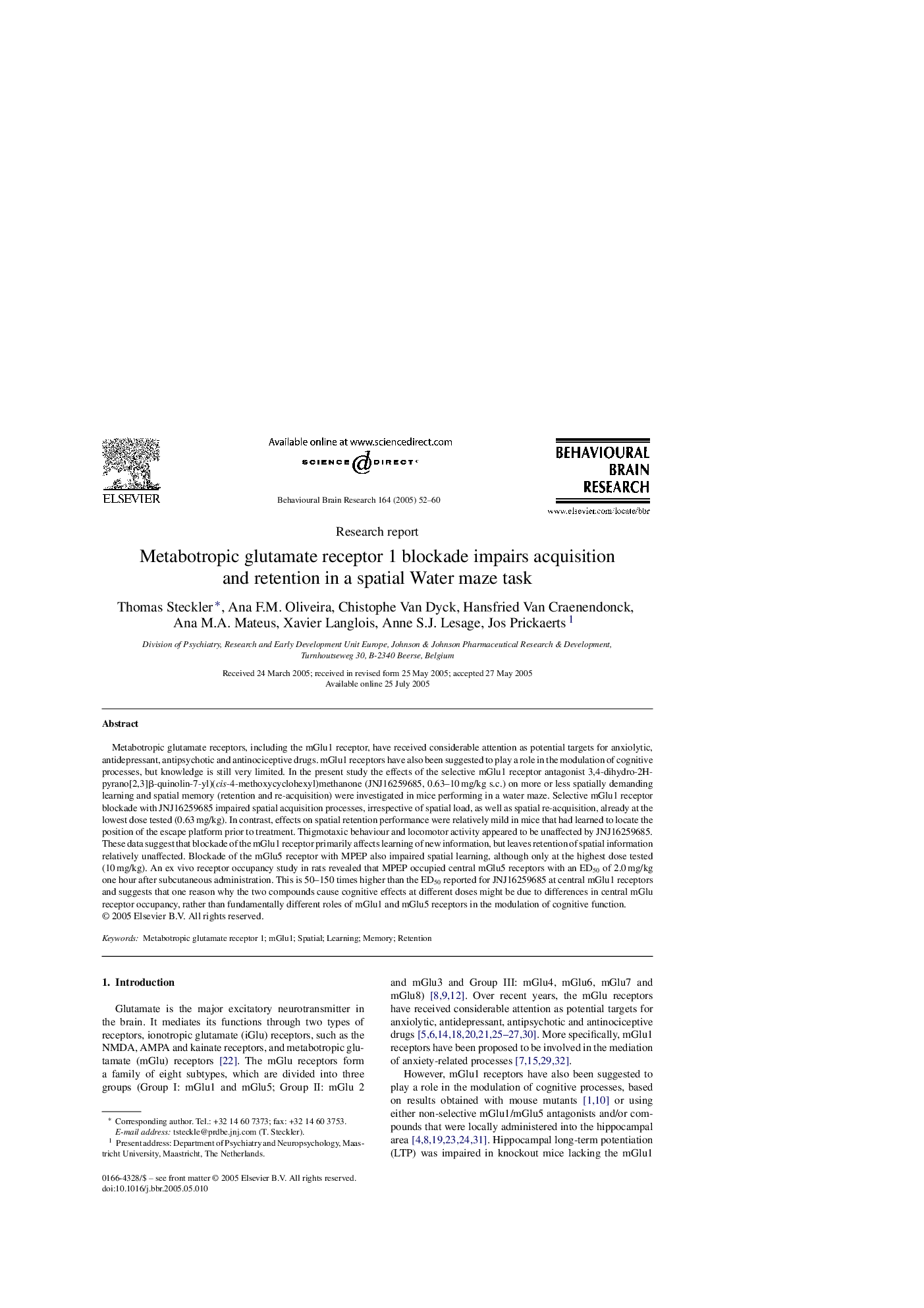| کد مقاله | کد نشریه | سال انتشار | مقاله انگلیسی | نسخه تمام متن |
|---|---|---|---|---|
| 9406527 | 1290127 | 2005 | 9 صفحه PDF | دانلود رایگان |
عنوان انگلیسی مقاله ISI
Metabotropic glutamate receptor 1 blockade impairs acquisition and retention in a spatial Water maze task
دانلود مقاله + سفارش ترجمه
دانلود مقاله ISI انگلیسی
رایگان برای ایرانیان
کلمات کلیدی
موضوعات مرتبط
علوم زیستی و بیوفناوری
علم عصب شناسی
علوم اعصاب رفتاری
پیش نمایش صفحه اول مقاله

چکیده انگلیسی
Metabotropic glutamate receptors, including the mGlu1 receptor, have received considerable attention as potential targets for anxiolytic, antidepressant, antipsychotic and antinociceptive drugs. mGlu1 receptors have also been suggested to play a role in the modulation of cognitive processes, but knowledge is still very limited. In the present study the effects of the selective mGlu1 receptor antagonist 3,4-dihydro-2H-pyrano[2,3]β-quinolin-7-yl)(cis-4-methoxycyclohexyl)methanone (JNJ16259685, 0.63-10 mg/kg s.c.) on more or less spatially demanding learning and spatial memory (retention and re-acquisition) were investigated in mice performing in a water maze. Selective mGlu1 receptor blockade with JNJ16259685 impaired spatial acquisition processes, irrespective of spatial load, as well as spatial re-acquisition, already at the lowest dose tested (0.63 mg/kg). In contrast, effects on spatial retention performance were relatively mild in mice that had learned to locate the position of the escape platform prior to treatment. Thigmotaxic behaviour and locomotor activity appeared to be unaffected by JNJ16259685. These data suggest that blockade of the mGlu1 receptor primarily affects learning of new information, but leaves retention of spatial information relatively unaffected. Blockade of the mGlu5 receptor with MPEP also impaired spatial learning, although only at the highest dose tested (10 mg/kg). An ex vivo receptor occupancy study in rats revealed that MPEP occupied central mGlu5 receptors with an ED50 of 2.0 mg/kg one hour after subcutaneous administration. This is 50-150 times higher than the ED50 reported for JNJ16259685 at central mGlu1 receptors and suggests that one reason why the two compounds cause cognitive effects at different doses might be due to differences in central mGlu receptor occupancy, rather than fundamentally different roles of mGlu1 and mGlu5 receptors in the modulation of cognitive function.
ناشر
Database: Elsevier - ScienceDirect (ساینس دایرکت)
Journal: Behavioural Brain Research - Volume 164, Issue 1, 14 October 2005, Pages 52-60
Journal: Behavioural Brain Research - Volume 164, Issue 1, 14 October 2005, Pages 52-60
نویسندگان
Thomas Steckler, Ana F.M. Oliveira, Chistophe Van Dyck, Hansfried Van Craenendonck, Ana M.A. Mateus, Xavier Langlois, Anne S.J. Lesage, Jos Prickaerts,